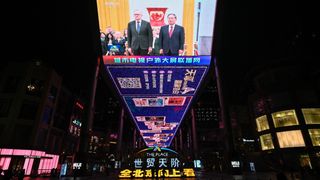The visit to China by Prime Minister Anthony Albanese this week is an important one for Australia’s international economic diplomacy. After years of Chinese economic coercion, the prospect of the return to something approaching the status quo ante in Australia-China trade arrangements would be of clear benefit to Australian export industries and the nation.
But the clinking of glasses in Beijing and Shanghai cannot obscure a deeper reality. Profound geopolitical currents are reshaping the global economic order in ways that signify no going back to the good old days of multilateralism and deep globalisation. We live in an age of strategic competition where the frictions of interdependence between our principal strategic ally and our major trading partner will continue.
Two propositions underpin the forces now driving the politics of international economic policy between nations. First, the flipside of interdependence is vulnerability. And second, when it comes to coping with vulnerability and managing risks, like-minded nations (aka friends) matter more than they used to.
The evidence for the first proposition is not hard to find. Consider the angst in the United States about the decline of its manufacturing base as it seeks to deter Chinese military adventurism over Taiwan. Or the painful realisation in Europe that energy dependence on Russia virtually enabled the largest land war on the continent for 75 years. In both cases, the global West is now acting to reduce economic reliance on authoritarian great powers seen as more than capable of weaponising interdependence.
The second proposition flows naturally from the first. New partnerships in the global economy are being forged that put less weight on narrow definitions of economic efficiency and more on the calculus of political alignment and resilience. The basic idea is simple. Amid geopolitical tension and what the International Monetary Fund calls a more “shock-prone world”, trust is the fundamental underpinning of any relationship, economic or otherwise.
Last week’s speech by US Treasury Secretary Janet Yellen on the Biden administration’s approach towards the Indo-Pacific provides a snapshot of this new era as seen from Washington. It was Yellen who first popularised the term “friend-shoring” to describe US efforts to diversity critical supply chains across a wide range of trusted partners and allies.
As you’d expect from a distinguished economist, Yellen used her remarks to affirm the case for expanded trade and investment in the Indo-Pacific region. Doubtless this was designed as much for her domestic audience as her international one, given the bad odour that surrounds trade agreements in the US capital. Her address also nodded appropriately to the need to tackle global challenges like climate change. And when it came to China, Yellen restated that the US does not seek to decouple from China, arguing it would be both disastrous and impractical.
The crux of her remarks, however, centred on bolstering national resilience in the face of various risks. This is now the central thrust of American foreign economic policy. While some argue that US National Security Adviser Jake Sullivan has taken international economic policy out of Yellen’s hands, the common themes in their speeches are clear.
First, the United States no longer regards greater economic integration with China as a self-evident good, especially if it means vulnerability around critical inputs. Second, the US will put its national security interests first. If that it means it pays an economic price, then so be it.
Third, when it comes to trade, the watchwords are “de-risking” and “diversifying”. In this vein, the US Treasury secretary name-checked supply chain resilience partnerships with South Korea, Vietnam, and India, as well as work through the Quad, APEC and the Indo-Pacific Economic Framework for Prosperity.
Where does this leave Australia?
For roughly three decades, our reliance on economic openness, World Trade Organisation rules and free trade agreements served us well. But as the FTA stalemate with the European Union shows, new market access wins are hard to come by.
Increasingly, cutting-edge debates are focused elsewhere under the rubric of “economic security”. In 2021, Japan established a minister for economic security, and the EU released its first economic security strategy in June this year. No surprise that Foreign Affairs carries a feature article on “The New Economic Security State” in its latest edition.
It would be easy to cast such developments in a negative light; as the misguided impulses of security hawks or old protectionist wine in new bottles. If only it were that simple.
Australians didn’t have to cheer when Sullivan buried the old “Washington consensus” earlier this year. But we had to take note.
Our economic statecraft may not need a revolution. But it needs a renovation for this age of strategic competition. The alternative is to get dragged along in the slipstream of others.






